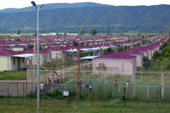Saakashvili temporarily out of politics
By Messenger Staff
Monday, November 18




On his Facebook page on November 15, he informed his online friends that he is moving on to academic activities. Analysts believe that staying in Georgia at this time would be dangerous for Saakashvili.
First of all, Saakashvili’s rating is rather low these days and, therefore, his position would be ignored by the population. At the same time, there are many people in Georgia who want Saakashvili to answer for the wrongdoings that occurred during his governance. And this could yield unpredictable consequences inside and outside the country.
Starting from 2010, Saakashvili was asked what his plans were after his second term as president. Some believed that through the amendments to the constitution, Saakashvili had planned to become the country's prime minister.
However, Bidzina Ivanishvili’s appearance on the Georgian political scene reshuffled Saakashvili’s plans. His United National Movement (UNM) lost the parliamentary elections in 2012 and Ivanishvili became the PM along with his Georgian Dream coalition. However, the latter will not benefit from the extra rights and powers the future PM will exercise and enjoy.
Just a couple of days before the inauguration of the new president on November 17, the former Ambassador of the US to Georgia, Kenneth Yalowitz, advised Saakashvili to leave Georgia and continue his activities within the academic sphere either in the US or in Europe. It looks like Saakashvili will follow this advice and dedicate his activities to political science giving-up his involvement in Georgian politics.
With regard to Saakashvili, there are many questions about his role in several tragic events in Georgia: losing the country’s territories as a result of the August War with Russia, the investigation behind the death of PM Zhvania, the bloody disperse of the peaceful rallies on November 7, 2007, and May 26, 2011, the case of death of a young banker, Sandro Girgvliani, and the abuse of financial discipline with regard to presidential and state funds, as well as many others could be used as a reason for inviting Saakashvili, who has lost his legal immunity after becoming an ordinary citizen, for interogation. It is also possible that he could be detained after the interrogation as it happened with the former PM Vano Merabishvili, who was also interrogated and later – detained.
While some US and European politicians condemn this option, here in Georgia there are still voices that demand the restoration of justice; the punishment of those who have committed illegal activities during the previous administration, and of course, directly or indirectly, they demand answers from everybody, including the former president.
Georgia’s Western allies are against such developments. However, Georgians remind their Western friends that the citizens of any country are equal according to the law, and being a high-ranking official is not an excuse for committing crimes.
Besides, there are multiple cases around the world where the former presidents or PMs, have been interrogated, and even jailed for their past behavior.
Georgians understand from Western trends, that this is an essential part of democracy. Being a politician is not an excuse or privilege, but rather a responsibility. These and some other issues are the things that endanger Saakashvili’s staying in Georgia.
Although the UNM remains the main oppositional team in the country, including the parliament, the Georgian Dream coalition still exercises an overwhelming advantage in the country. Many politicians suggest that it would be better for Saakashvili if he would totally give up politics. However, knowing his enthusiasm and energy, this is unlikely.
